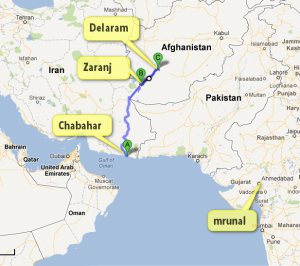
India expects its new port in Iran’s Chabahar harbor, which will give India sea-land access to Afghanistan, bypassing Pakistan, to be operational by December of next year, Indian Transport Minister Nitin Gadkari said.
“Work has started on the Chabahar port. There is a joint venture of Kandla Port Trust (KPT) and Jawaharlal Nehru Port Trust (JNPT)…. We will start port activities in a year or a year-and-a-half,” he told the Press Trust of India (PTI).
He said a draft agreement will be signed within three months. “I have given the orders to bring out tenders for purchasing cranes for the port. An agreement will be signed within a month.”
The port will be developed through a special purpose vehicle (SPV), which will invest $85.21 million to convert the berths into a container terminal and a multi-purpose cargo terminal. India intends to lease two berths at Chabahar for 10 years.
Access to Afghanistan’s Garland Highway can be made from Chabahar port using the existing Iranian road network and Afghanistan’s Zaranj-Delaram road, constructed by India in 2009 in anticipation of being able to use Chabahar long ago.
The project was supposed to have been in place more than a decade ago. The original agreement to develop Chabahar for India’s use was signed in 2003, but nothing has so far happened.
Since 2012, US sanctions have stopped the project. But long before sanctions on banking transactions were imposed, many hardliners in Iran opposed the idea of Iran helping India to develop access—and influence—in Afghanistan. Those hardliners were the main block on the project until the Rohani Administration took office.
India wants to counter Pakistani influence in Afghanistan, but many in Iran have feared India would also counteract Iranian influence in the landlocked state.
